- Home
- Andrew McGahan
The War of the Four Isles Page 11
The War of the Four Isles Read online
Page 11
*
There was no need for secrecy now. At the change of the watch, Captain Fletcher called the entire crew to the main deck, and with an impassive Colonel Oliver standing at his side, announced to the waiting men and women their ultimate destination.
Dow, lined up with the other officers at the high deck rail, saw much surprise and unease on the crew’s upturned faces at first, as the captain spoke of crossing the Outer Ocean, and then alarm and even outright fear as Fletcher went on to describe the attempt they would make on Banishment. A murmur of doubt swirled up, threatening to become open protest . . .
Captain Fletcher – with an uncomfortable sideways glance at the emotionless Colonel Oliver – raised his hands calmingly. ‘I know, lads and lasses, I know. But the War Master has expressed his faith that we can achieve this, and so we should consider ourselves honoured. If Damien Tender believes we can succeed, then so do I. Otherwise I would not go.
‘True, it is a voyage longer and more landless than any of us have undertaken before, even those of us who once served on the whaling fleet. No Twin Islands ship has ventured further than a fortnight’s sail west of our homelands since before the Great War. But are we not mariners still? Is this not a mariner’s purpose, to test himself against the winds and waters? Think of the glory that will be ours, the first of our folk to dare the Wilderness in generations!’
The captain shot another glance at the colonel – who now deigned to give a minimal nod, apparently in support – before concluding.
‘So take heart, men and women. And if the lure of the sea is not enough to waken your courage, then think on this: we sail with the famous Dow Amber, and it is at his request to the War Master that we have accepted this task. And do any of you think it is the Young Admiral’s fate to be lost or drowned in the mere crossing of an ocean? No – his is a greater fortune, we all know that, and so be assured that just as he will come across the Outer Ocean unscathed, so shall we.’
Five hundred faces turned to Dow, who could only stare back, startled.
‘Dismissed!’ said the captain.
Afterwards, having watched the crew disperse – some mumbling uncertainly, but most apparently mollified for the moment – Dow sought out Johannes to share his bemusement. It was a captain’s duty, no doubt, to inspire his crew with confidence at the start of any voyage; still, Dow hadn’t expected that Fletcher would speak so approvingly of their mission, without any hint of his private reluctance, let alone that he would link the fate of the ship to Dow’s own.
In response, the blacksmith pursed his lips thoughtfully. ‘I may have an answer to that,’ he said. ‘I was passing by the captain’s cabin last night, and who did I catch just as they were coming out, but Cassandra and that Colonel Oliver. They’d been having a word with our commander, it seems. You recall those secret orders that Cassandra spoke of when she came on board? I think last night she delivered them. And lo – suddenly Captain Fletcher, having been against our mission from the start, emerges this morning its keenest advocate. And also, your friend once more! All well and good, except to me he sounded just now like a nervous man acting under duress.’
Dow frowned. ‘You think they threatened him? That Cassandra threatened him?’
Johannes shrugged. ‘Maybe not her. But Colonel Oliver? Him I can imagine making any sort of threat you like – and then backing it up.’
Dow could only nod pensively. The colonel was a disturbing and unknown quantity.
And yet what bothered him even more was the news that Cassandra had emerged from her self-imposed seclusion finally – for this was the first time he’d heard of her leaving her cabin for any length of time since their departure from Black Sands – and yet she still hadn’t come to see him. Why not? How could she go from kissing him one afternoon to not speaking to him for weeks afterwards?
It was confounding.
*
Properly launched at last on its great expedition, the Snout shook the memory of land from its flanks, and gathered speed westwards.
For the next several days, as if in benevolent reply to the captain’s speech, the seas rolled fair and friendly under the bow, and the wind blew warm and steady out of the east; a good omen, for although the winds at this latitude generally did blow from east to west – in fact, they were so prevailing they even had a name, the West Band winds – they were known to be fickle, and often failed altogether. Mariners much preferred to make use of the East Band winds, which blew stronger, and more reliably, west to east in the higher latitudes. Indeed, if a ship sailed north from the Twin Isles until it met the East Band stream, and then turned east, it could reach Great Island in half the time it might waste on the longer and more doubtful route west.
But the Snout had no choice in the matter, west it must go, and for now at least the wind did not falter. In fact flawless day followed flawless day, and slowly the anxious mood about the ship began to lift. A new demeanour stole over the crew, an awakening to the adventure upon which they were embarked. For two and a half years they had sailed only to patrol the dull confines of the Southern Reach, all but forgotten by the war. But now they were setting forth upon a voyage that could end the war, and which would take them across waters that none of their countrymen had seen in nearly a hundred years.
Dow felt it too. Not since his voyage to the Unquiet Ice with the Chloe had he set out on an expedition so wide and lonely, and he was caught off guard by the strength of his old sea-hunger, stirring from its long sleep. He hadn’t even realised how starved he was, but now – to be sailing again! Months of open sea lay ahead, free of the war and of all cares other than those of steering the ship and trimming the sails. It was a wonderful prospect . . .
His only irritation remained Cassandra. On the fourth day out from Red Island she at last appeared topside to take the air on the main deck. But it was while Dow was busy with duties in the forecastle, and so he could not join her. The same thing happened the next time she came on deck, and the time after that; it was always when Dow was occupied with some chore or other. She would not even glance his way as she strolled with the other officers. And at night she still took her meals alone in her own cabin.
There could be no doubt about it: she was deliberately avoiding him. Dow was infuriated. What in the world had he done to deserve such treatment? And anyway, she was being foolish, it was quite impossible for two people not to meet sooner or later in the environs of a single ship engaged on a long voyage.
A point that was soon proved. A week out to sea, Dow was sent on an errand down to the hold, and literally stumbled into Cassandra on the stairs of the First Lower deck, neither of them watching where they were going.
His first reaction as they pulled apart was to blurt out, ‘What are you doing down here?’ – for in all the time he’d known her, the laundress had rarely ventured down to the lower decks, especially not to the gloomiest levels below the waterline; she found them, by her own admission, too claustrophobic.
She blushed deeply. It was then that Dow noticed someone was coming up the stairs behind her; a taut, angry face. Colonel Oliver.
Cassandra answered stiffly, ‘We’re on assignment from the captain. He wants to be sure we can accommodate the Banishment prisoners. We’ve been inspecting First Lower. If space is cleared, a secure barracks could be fashioned for them down here.’
Dow blinked. It seemed an oddly premature task – and hardly one that required the laundress’s presence. ‘We’re going to put them in a hold? They’ll suffocate!’
Colonel Oliver was studying him now, eyes narrowed. ‘There’ll be air enough, Lieutenant. If you’ll excuse us, the laundress and I are occupied.’
He shouldered by Dow with a deliberate show of size and force, and moved up the stairs.
Cassandra went to follow, but Dow stayed her with one hand, emotions crowding up in him angrily. ‘What’s going on with you?’ he demanded in a low voice. ‘Why are you avoiding me?’
She glanced after the departing colonel, w
ho was climbing on unhalting, then gave Dow a vexed look. ‘I’m not avoiding you. Why would you think that? I’ve been busy, that’s all.’
‘Busy doing what? Wandering about down here? Since when is that your job?’
‘It’s none of your business.’
‘And what about our reading lessons? Are you too busy for them too?’
She shook her head tightly, not meeting his eyes now. ‘You don’t need teaching anymore. You can read well enough to continue on your own. The lessons were a chore for both of us anyway.’
This was such a blatant lie – Dow knew perfectly well she had always enjoyed their classes together – that for a moment he forgot his anger; something must be seriously amiss to make her say such a thing. He bent down a little so that his gaze met hers unavoidably. ‘Cassandra, what’s wrong?’ he asked. ‘What’s happened?’
But she only turned away stubbornly. ‘Nothing has happened! And nothing is wrong. I don’t know what you want me to say. Just leave me be!’
He pulled back, surprised at the venom in her, and taking her chance she pushed past him and hurried away up the stairs, leaving Dow to stare after her, more nonplussed than ever.
*
But otherwise all seemed well on the ship, and for two weeks the festival air prevailed. The West Band winds held warm and steady; the sun shone brightly, but without blazing or burning; the sea was mild and blue; and the Snout ploughed sturdily on night and day, not swift maybe, but sure. And though Captain Fletcher kept the ship on a military footing, with a full watch set aloft, and with regular drilling of the crew, there was an inescapable relaxation everywhere, for the war was falling further and further behind. They would meet no enemies upon the Outer Ocean.
At least, no human enemies. There were, of course, other perils in the world. And in their third week out, as they passed beyond the range of even the most widely roaming whaling ships and so into the true unknown, the weather finally turned. The West Band winds veered to blow from the south-east, and then veered further still to blow from the south, strengthening in gusts over the course of a day into a blustery crosswind.
The seas rose in accord. In time, a confusing swell was rearing from all sides, the ship heaving over this way and that at random. It was as if a great storm was brewing in the vicinity – but there were no clouds to be seen anywhere; the sky was innocently blue.
Conditions worsened overnight; by dawn a true gale was ripping across the troubled sea, and though the sky remained clear, there was a bruised and baleful look to it now, a darkening of the upper airs. At noon Emmet Bone, who had made only the rarest of appearances about the ship in the previous weeks, suddenly showed himself on the high deck to sniff the wind with grim relish.
‘What say you, sir?’ enquired Captain Fletcher, who was hunkered by the wheel.
The pilot bared his teeth. ‘I say a hurricane is brewing ahead of us.’
‘Aye. So I think also.’
Dow, on watch nearby, glanced in puzzlement at the cloudless firmament. Since going to sea he had heard much talk of hurricanes; great spinning storms, hundreds of miles across, that blew for days over tortured oceans. But those storms, so the tales said, only occurred in the higher and wetter latitudes, and were things of cloud and drenching rain. They did not come from a clear sky.
Captain Fletcher noted his confusion. ‘The good pilot means a dry hurricane, Mr Amber.’
A dry hurricane? What was that? Dow squinted directly up at the sun, strangely pale and dim amid the cerulean hues of the noon sky. He could sense a great weight of something up there, wheeling in the high atmosphere. But still, it was only daylight . . .
Emmet Bone said, ‘Forget storms as you know them, New Islander. These hurricanes do not blow grey and wet; they are born in the heat of the Doldrums, and thus they are dry, for in the air above the Barrier’s warm waters – where nicre thrives and evaporation is strangled – there is no moisture, and hence no clouds or rain. Even so, such storms are as fierce as any northern hurricane. And they are more common here in the Wilderness than they are in the Middle Sea, for here they have half a world’s fetch of empty ocean over which to gain strength.’
‘Another reason the Outer Ocean is to be avoided,’ added Captain Fletcher, with a touch of his old bitterness. ‘Now we can but hope that the path of this storm lies away from our own.’
But it seemed the captain would not be granted his hope. The gusts continued to strengthen throughout the day, heaving the Snout hard over as it plunged through the swells. Night saw the stars dimmed to a blur by the force of the wind, and when the red dawn came a hot gale was blowing out of the south-west, shrieking so madly across the tumultuous sea that the ship could bear no more than a scrap of sail aloft for fear of capsizing.
‘Aye,’ cried Emmet Bone cheerfully to the captain, ‘’tis a hurricane for sure! Eye dead west of us, by the wind, and heading north-east.’
The captain nodded gloomily, eyes narrowed into the wind and spray. ‘Come left,’ he bawled to the helmsmen – there were eight of them in the heavy conditions, and even all eight could scarce control the wheel. ‘Smartly now, due south!’ In a bellowing aside to the pilot he added, ‘We’ll slip underneath the damn thing!’
The pilot gave an ugly grin. ‘Fine with me, as long as the hurricane holds its course. And as long as you don’t stray too far south, Captain!’
As Dow understood it, the Snout was angling across the gale in an effort to avoid the even deadlier winds that would be howling about the hurricane’s eye. A fact for which he was grateful; he had begun to suspect that this might be a storm worse even than the wintry squalls that had battered the Chloe on its way to the Unquiet Ice.
After all, those squalls had come and gone in quick succession, but this storm showed no signs of fading away; it only grew in ferocity. And while the northern squalls had attacked with snow and ice and sharply rearing waves, the dry hurricane attacked with a blunter brutality. The hot wind, for instance. It blew relentlessly, its yowling and moaning hammering at one’s ears until they ached. And strangely its very warmth made it all the more terrible. It didn’t bite like an icy wind would; it suffocated, it bore down as oppressively as a smothering hand over the mouth, making it hard to breathe, and setting exposed skin itching painfully like sunburn.
Stranger still, the monstrous seas were surreally bright beneath the glaring sky. It was beyond all Dow’s experience to behold great waves rising that were not black or grey under storm clouds, but a sunlit blue, streaked with glittering white. When they crashed across the Snout’s deck the flood was as warm and cloying as bathwater, and when they drained away again, mists and steams rose from the drenched timbers to be whipped away on the wind. From the wave-tops, meanwhile, that same wind tore a stinging salt spray that parched already dry lips and inflamed eyes already dazzled by the sun.
In short, it was maddening. But the crew could do nothing except endure. Throughout all that day the hurricane blew, and then on into the night, and now the wind came directly from the west, more furious than ever, singing in a high metallic wail. The ship must be rounding the eye, said the weather-wise hands; the storm’s whirling core should now lie somewhere north of them.
Dow spent most of that night in the hold, overseeing the operation of the ship’s pumps. (The Snout was taking on plenty of water, but one of the advantages of Twin Islands ships was that they possessed mechanical bilge pumps capable of expelling such water by force.) But at dawn a sudden hue and cry summoned him topside. He emerged onto the main deck to find that all eyes were turned to the northern horizon: there, a staggering vision loomed, an inversion seemingly of natural law.
At first Dow thought it was rain. Rain in the heart of a dry hurricane. Only it wasn’t falling from the sky, it was rising from the ocean. Disbelieving, he struggled across to the rail and held on there, staring into the spray, as the Snout heaved in the huge swell.
In fact, his eyes had only half deceived him; in a great circular wall, maybe twenty
miles across, water was indeed sheering upwards from the ocean. But it wasn’t rain, instead it was being whipped up by a series of whirling pillars that stalked in monstrous procession around the circle. Tornados, dozens of them. And where they touched down, vapour exploded from the sea, to rise in writhing funnels a mile, two miles and more into the sky.
There, the funnels disgorged their loads into the base of a great cloud that crouched over the circle, immense, and growing ever larger as it fed. It was a single, gigantic thunderhead, black at its base, and flickering with pale stabs of lightning, but towering to the uppermost atmosphere where it glowed as white as ice in the coming dawn.
Dow blinked wordlessly at the spectacle. He was gazing, he finally realised, at the hurricane’s eye. They had strayed much closer to it than the captain intended. And how strange – in a normal hurricane, the tales went, the eye was the one place where the clouds drew back; but with a dry hurricane it seemed the opposite was true, and the eye was the one place where clouds rose, while all about was blue sky, as dry as a desert.
But now Dow could stare into the stinging gale and spray no longer, he had to look away – and found that Emmet Bone was at his side, water streaming down his weathered face. ‘A rare sight, Mr Amber,’ the pilot bellowed over the din. ‘One for which I’d almost forgive you dragging us all out on this benighted errand.’
Dow said nothing, only wiped his eyes and peered again at the great pillars of the tornados. They were hypnotic in their majesty, moving with the same inexorable and deadly stateliness that he had witnessed in the collapse of giant icebergs in the north, or in the vast rotations of the maelstrom.
The pilot added at a shout, ‘Of course, this is not a powerful hurricane. If it were, we could never hope to pass so close to the eye and yet live. I’ve seen far fiercer storms than this in my travels.’

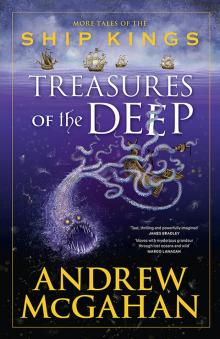 Treasures of the Deep
Treasures of the Deep The Rich Man’s House
The Rich Man’s House Praise
Praise The White Earth
The White Earth 1988
1988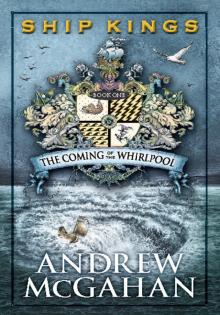 The Coming of the Whirlpool
The Coming of the Whirlpool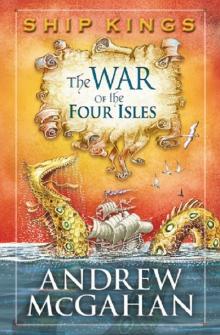 The War of the Four Isles
The War of the Four Isles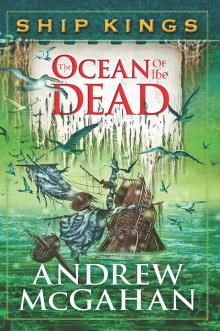 The Ocean of the Dead: Ship Kings 4
The Ocean of the Dead: Ship Kings 4 Last Drinks
Last Drinks Wonders of a Godless World
Wonders of a Godless World Underground
Underground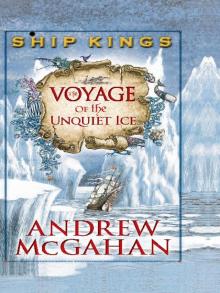 The Voyage of the Unquiet Ice
The Voyage of the Unquiet Ice